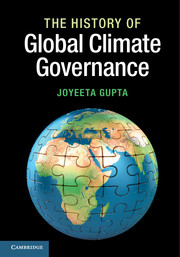Book contents
- Frontmatter
- Dedication
- Contents
- Foreword
- Preface and acknowledgements
- List of abbreviations
- Part 1 Introduction
- Part 2 The history of the negotiations
- Part 3 Issues in global climate governance
- 8 Countries, coalitions, other actors and negotiation challenges
- 9 Litigation and human rights
- Part 4 Towards the future
- References
- Index
9 - Litigation and human rights
from Part 3 - Issues in global climate governance
Published online by Cambridge University Press: 05 February 2014
- Frontmatter
- Dedication
- Contents
- Foreword
- Preface and acknowledgements
- List of abbreviations
- Part 1 Introduction
- Part 2 The history of the negotiations
- Part 3 Issues in global climate governance
- 8 Countries, coalitions, other actors and negotiation challenges
- 9 Litigation and human rights
- Part 4 Towards the future
- References
- Index
Summary
Introduction
In the pre-negotiation days (Phase 1), early political declarations and articles discussed the issue of ‘responsibility’ (see Chapter 2). At the time, the concept combined ideas of liability for harm caused to others calling for compensation, with ideas of taking a responsible approach. In Phase 2 of the negotiations and leading up to the adoption of the United Nations Framework Convention on Climate Change (UNFCCC), the use of ‘neutral’ language became popular. Neutral language is used in the IPCC-III (1990: xxvi) report. Curiously, the report also raised two questions: ‘Should mankind’s interest in a viable environment be characterized as a fundamental right?’ and ‘Is there an entitlement not to be subjected, directly or indirectly, to the adverse effects of climate change?’ (IPCC-III, 1990: lviii). The text of the Climate Convention also embodied an implicit acceptance that climate change was a global commons problem – which implied a ‘neutral factual statement’ with no intent to point fingers at individual countries (Bodansky, 1993: 498). The convention adopted the concept of responsibility more in terms of the ‘leadership paradigm’ (see Chapter 3) and the common but differentiated responsibilities and respective capabilities (CBDR) principle. Responsibility in terms of liability had morphed into responsibility in terms of leadership (Gupta, 1998).
In Phase 3, the perception of the high costs of reducing emissions led to greater emphasis being paid to cost effectiveness as a critical guiding principle and market instruments to promote the implementation of the convention. Leadership was beginning to flag. By Phases 4 and 5, legal options had increasingly become an important issue for discussion and the number of court cases on climate change-related issues began to rise. The issue of human rights also became gradually important (see 9.3). In the future, as the impacts of climate change become increasingly more evident, I think it will be inevitable that legal avenues will be chosen by countries and social actors as a way to promote climate justice. Section 9.2 presents the legal options discussed in the literature and in existing court cases before moving to a more theoretical exploration of the options. The following section discusses human rights issues (see 9.3).
- Type
- Chapter
- Information
- The History of Global Climate Governance , pp. 173 - 190Publisher: Cambridge University PressPrint publication year: 2014



